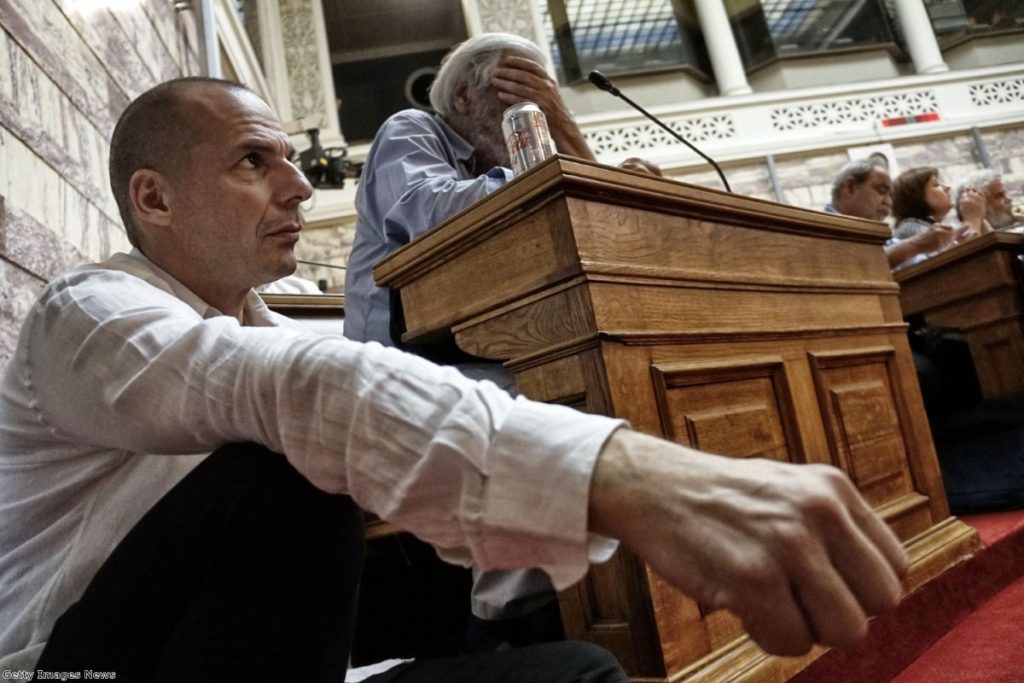Greek crisis shows the eurozone is a thug enforcer for capitalism
This is how the eurozone punishes those who demand democratic control over their country. When Syriza came to power they had a very clear mandate to renegotiate the bailout agreement. The eurozone did not budge an inch.
When it delivered it's final bailout deal, Greek prime minister Alexis Tsipras announced he would put the deal to a referendum. The Greek parliament voted on the plan and passed it. The Greek PM asked for a short extension of the bailout programme from next Tuesday, when it was due to end, to the weekend, when the referendum was due to be held.
In an act of extraordinary disrespect, eurozone finance ministers refused. They excluded Greece from the meeting. The high rhetoric of unity and international cooperation is quickly forgotten when referendums are mentioned. Finance minister Yanis Varoufakis asked the legal basis of that decision. They said there never were any legal safeguards. "The eurogroup is an informal group," he was told. "Thus it is not bound by treaties or written regulations. The eurogroup president is not bound to explicit rules."
On Sunday, the European Central Bank refused to continue providing liquidity to Greece after the Tuesday deadline, forcing the country to close its banks and introduce capital controls. This was as brutal and thuggish a display of economic power as you can imagine. It was simultaneously a punishment for holding a referendum in the first place and an attempt to influence the vote by sabotaging the country in advance of it. The message is clear: do what we tell you or we'll ruin you.


There has been a very effective and widespread PR mopping-up operation following the finance minsters. International Monetary Fund boss Christine Lagarde, who publicly said the Greek negotiators were not "adults" during talks, tried to knock down the referendum by claiming the bailout deal would not even really exist by the time Greeks voted on it. Even if they voted to accept it, Europe and IMF reserved the right to take it away.
The press lashed out at Tsipras. Pro-Europeans despise him for demonstrating that Europe is not a one-way process. Even if somehow Greece stays in the eurozone, it has demonstrated that exit is in no way impossible. Free market ideologues resent the Greek prime minister for offering voters a say on their economic destiny. As the Financial Times wrote in its editorial yesterday, the only way a referendum could be accepted was if it was intended to make voters accept what creditors demanded. "A referendum could be justified if its purpose was to bolster Greek support for the difficult measures ahead," it said, without any hint of irony. And the respectable commentators just smirk at the childishness and irresponsibility of participatory democracy. For them, anything over and above general elections twice a decade is a madness.
Of course, Greece is largely – if not entirely – responsible for its problems. Unlike in many other countries, its banks were not actually especially badly behaved. But public spending was too high, corruption too pervasive and tax evasion endemic. That is true, but the truth of it does not mean that Greeks should suffer a lifetime of eurozone-mandated poverty.
The eurozone plan is for hardship without end: an economic vision in which debts would never be repaid, in which more and more children – 40% at last count – are pushed into poverty, in which pensioners are robbed of any money for a decent or dignified old age, in which there can be no economic growth. It is permanent economic slavery to creditors.
The eurozone didn't even try to recognise the democratic mandate from Greece. As even the Financial Times admitted: "Their offer may have been acceptable. It was, however, not generous, omitting even a contingent promise of much-needed debt relief."
There is a reason people pay interest on debt. It is because by loaning the money the lender is taking a risk. That's why they profit from the arrangement. And sometimes, to some extent, that risk becomes a reality. But the eurozone seemingly cannot countenance this. All that matters is that Greece repay the money while driving its own citizens into poverty. Offering them a vote on that choice is to invite punishment in the most brutal economic manner possible.
Its secondary function was to provide a warning to other eurozone countries thinking of demanding control over their destiny, or left-wing parties, like Podemos in Spain, who might dare think that a democratic mandate would strengthen their hand in negotiations. The will of the public does not matter. Only the market matters.
If there is anyone on the British left who still believes that Europe offers a safeguard against unbridled capitalism, this episode must surely relieve them of the idea. Maastricht handed power over economic affairs to shadowy bureaucrats who set about immediately protecting business and deregulating markets. The single currency has weaponised austerity. This is not some all-singing all-dancing union. It is a union of the rich doing whatever they want. Germany and the creditors now rule Greece. The election of Syriza was an act of rebellion and it has been sternly punished.
It's not even the first time. The Eurozone already prevented a Greek referendum on bailout terms – this time back in 2011. It was exactly the same story. Germany and France openly threatening Greek prime minister George Papandreou with exclusion from the eurozone if he continued. This is not a new development. It is how the eurozone does business.
The treatment of the Greek people shows it for what it is: a thug enforcer for capitalism.












